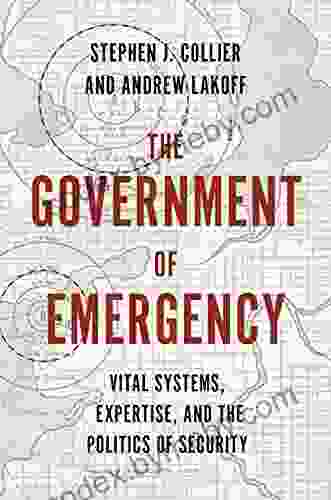Vital Systems Expertise and the Politics of Security: Expert Knowledge in the Shaping of National Security Policy

The role of experts in the shaping of national security policy has been a subject of increasing debate in recent years. Some argue that experts play a critical role in providing policymakers with the knowledge and advice they need to make informed decisions. Others argue that experts are often biased and misleading, and that their advice can lead to bad policy decisions.
5 out of 5
| Language | : | English |
| Text-to-Speech | : | Enabled |
| Enhanced typesetting | : | Enabled |
| Word Wise | : | Enabled |
| File size | : | 21077 KB |
| Print length | : | 462 pages |
| Screen Reader | : | Supported |
This book examines the role of vital systems expertise in the shaping of national security policy. Vital systems are those systems that are essential to the functioning of a modern society, such as energy, water, and transportation. The expertise of experts in these areas is essential for policymakers to understand the threats facing these systems and to develop the policies to protect them.
However, the author argues that the expertise of experts is not always objective or apolitical. Instead, it is often shaped by the interests of the institutions and organizations that employ them. As a result, the advice that experts provide to policymakers can be biased and misleading.
The book concludes by calling for a more critical approach to the use of expert knowledge in national security policymaking. Policymakers should be aware of the potential biases of experts and should seek out multiple sources of information before making decisions.
Chapter 1: The Role of Vital Systems Expertise in National Security Policymaking
The first chapter of the book provides an overview of the role of vital systems expertise in national security policymaking. The chapter begins by defining vital systems and discussing the threats that they face. The chapter then examines the role of experts in assessing these threats and developing policies to protect vital systems.
The chapter concludes by arguing that the expertise of experts is essential for policymakers to make informed decisions about national security. However, the chapter also warns that the expertise of experts is not always objective or apolitical.
Chapter 2: The Politics of Vital Systems Expertise
The second chapter of the book examines the politics of vital systems expertise. The chapter begins by discussing the different interests that are represented by experts in this field. The chapter then examines how these interests can shape the advice that experts provide to policymakers.
The chapter concludes by arguing that the politics of vital systems expertise is a complex and often hidden process. Policymakers should be aware of this process and should seek out multiple sources of information before making decisions.
Chapter 3: The Case of Cybersecurity Expertise
The third chapter of the book provides a case study of the role of cybersecurity expertise in national security policymaking. The chapter begins by discussing the growing importance of cybersecurity and the threats that it poses to vital systems. The chapter then examines the role of experts in assessing these threats and developing policies to protect vital systems.
The chapter concludes by arguing that the case of cybersecurity expertise illustrates the complex and often contradictory role that experts play in national security policymaking.
The book concludes by calling for a more critical approach to the use of expert knowledge in national security policymaking. Policymakers should be aware of the potential biases of experts and should seek out multiple sources of information before making decisions.
The book also calls for more research on the role of vital systems expertise in national security policymaking. This research should examine the different interests that are represented by experts in this field and how these interests can shape the advice that experts provide to policymakers.
5 out of 5
| Language | : | English |
| Text-to-Speech | : | Enabled |
| Enhanced typesetting | : | Enabled |
| Word Wise | : | Enabled |
| File size | : | 21077 KB |
| Print length | : | 462 pages |
| Screen Reader | : | Supported |
Do you want to contribute by writing guest posts on this blog?
Please contact us and send us a resume of previous articles that you have written.
 Book
Book Novel
Novel Page
Page Chapter
Chapter Text
Text Story
Story Genre
Genre Reader
Reader Library
Library Paperback
Paperback E-book
E-book Magazine
Magazine Newspaper
Newspaper Paragraph
Paragraph Sentence
Sentence Bookmark
Bookmark Shelf
Shelf Glossary
Glossary Bibliography
Bibliography Foreword
Foreword Preface
Preface Synopsis
Synopsis Annotation
Annotation Footnote
Footnote Manuscript
Manuscript Scroll
Scroll Codex
Codex Tome
Tome Bestseller
Bestseller Classics
Classics Library card
Library card Narrative
Narrative Biography
Biography Autobiography
Autobiography Memoir
Memoir Reference
Reference Encyclopedia
Encyclopedia Christine E Sleeter
Christine E Sleeter Christopher Burkett
Christopher Burkett Christine Butegwa
Christine Butegwa Chris Albon
Chris Albon Christine M Benton
Christine M Benton Kathy Stanton
Kathy Stanton Chris Tuff
Chris Tuff Chip Kidd
Chip Kidd Chris Batha
Chris Batha Chinle Miller
Chinle Miller Kate Staves
Kate Staves Elisabeth Robson
Elisabeth Robson Nancy Carey Johnson
Nancy Carey Johnson Cindy Goldrich
Cindy Goldrich Kinshasha Holman Conwill
Kinshasha Holman Conwill Christine Pride
Christine Pride Leander Kahney
Leander Kahney Claire Devarrieux
Claire Devarrieux Christopher G Nuttall
Christopher G Nuttall Christopher Boehm
Christopher Boehm
Light bulbAdvertise smarter! Our strategic ad space ensures maximum exposure. Reserve your spot today!

 Cody BlairThe French Revolution and the Reign of Napoleon: A Historical Journey Through...
Cody BlairThe French Revolution and the Reign of Napoleon: A Historical Journey Through... Manuel ButlerFollow ·4.9k
Manuel ButlerFollow ·4.9k Cole PowellFollow ·14k
Cole PowellFollow ·14k Quentin PowellFollow ·7.9k
Quentin PowellFollow ·7.9k Dustin RichardsonFollow ·13.4k
Dustin RichardsonFollow ·13.4k Tennessee WilliamsFollow ·5.6k
Tennessee WilliamsFollow ·5.6k Ruben CoxFollow ·14.5k
Ruben CoxFollow ·14.5k Edgar HayesFollow ·12.8k
Edgar HayesFollow ·12.8k Eric HayesFollow ·10.6k
Eric HayesFollow ·10.6k

 Rick Nelson
Rick NelsonThe Power of Positivity: 51 Motivational Quotes to...
In the tapestry of life, we encounter...

 Lee Simmons
Lee SimmonsThe Indian War of 1864: A Devastating Conflict in the...
The Indian War of 1864 was a brutal...

 Eddie Bell
Eddie BellQueen: The Unauthorized Biography: Unraveling the Secrets...
Prepare to delve into the captivating...

 Dion Reed
Dion ReedUnveiling the Imperfect Gems of Trauma and...
In the tapestry of...

 Desmond Foster
Desmond FosterThirty-Six Years in the Rockies: A Timeless Masterpiece...
A Journey Through Time and...
5 out of 5
| Language | : | English |
| Text-to-Speech | : | Enabled |
| Enhanced typesetting | : | Enabled |
| Word Wise | : | Enabled |
| File size | : | 21077 KB |
| Print length | : | 462 pages |
| Screen Reader | : | Supported |












